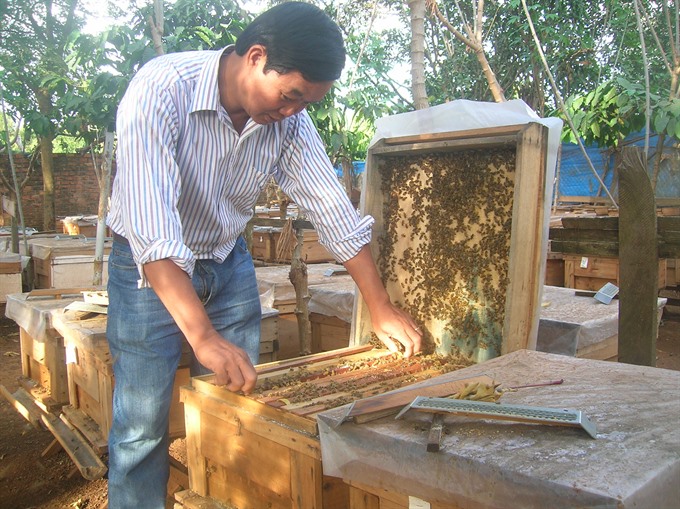 Economy
Economy

Việt Nam expects to have sustainable development of the domestic honey and bee industry to improve output and quality of honey over the next two years.
 |
| Daklak Honey Bee JSC. - Photo baodaklak.vn |
HÀ NỘI – Việt Nam expects to have sustainable development of the domestic honey and bee industry to improve output and quality of honey over the next two years.
This was revealed by Ministry of Agriculture and Rural Development’s Animal Husbandry Department expert Trần Ngọc Lan during a seminar in Hà Nội yesterday.
Hosted by Việt Nam Beekeepers Association and Syngenta Company, the event was told that the industry is aiming to increase the output of honey from 1-1.5 per cent a year.
It would concentrate on the development of Italian bee, one of the many foreign bees farmed here, for export, and foreign bee varieties from 75 per cent to 80 per cent by 2020.
To have sustainable development of the industry, it would choose and produce high quality bee varieties as well as import new bee varieties for improving the domestic market, Lan said.
In addition, the industry would build a national standard for bee products to meet EU standards and closely monitor quality.
According to Lan, beekeeping is now a priority in the restructure of the livestock sector. The Department of Livestock reports Việt Nam currently has nearly 1.2 million bee colonies including 16.6 per cent being domestic bees and 83.4 per cent being foreign bees. They are kept mainly in the northern mountainous region and the Central Highlands region.
According to Nguyễn Thanh Sơn, head of the National Institute of Animal Science, Việt Nam is the second largest honey exporter in Asia and the sixth largest honey exporter in the world.
The nation has produced more than 55,000 tonnes of honey and more than 1,000 tonnes of beeswax each year. About 90 per cent of Việt Nam’s honey output is exported. Việt Nam’s honey consumption markets are mainly the US, Europe and Japan, places that demand the highest quality.
In 2014, Việt Nam exported nearly 50,000 tonnes of honey, earning US$150 million. However, the exports reduced in the past three years, due to various reasons at home and abroad. In 2017, Vietnam exported only 39,000 tonnes.
However, Phạm Đức Hạnh, director of the Bee Centre under the National Institute of Animal Science, said the local bee keeping industry had small scale production, low sustainability, productivity, unstable quality of product and low competition.
This was not to mention cooperation among beekeepers and the density of bee keeping in some localities were not reasonable. Those had led to unsustainable harvests and affected the productivity and quality of honey.
The processes of quality control, exploitation, preservation and processing had been not closely to improve the quality of honey, Hạnh said.
Nguyễn Đăng Thơ, on behalf of beekeepers, said at the seminar that the Ministry of Agriculture and Rural Development and relevant state offices should seek solutions for export of bee products and have policies protecting beekeepers for sustainable development of the bee-keeping industry.
The association and businesses should cooperate with beekeepers in production and business so the beekeepers have confidence in investing in the trade, he said. - VNS




